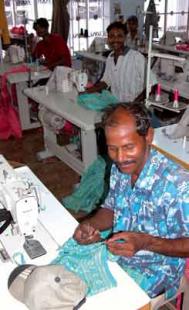IN THE PAST two years, the issue of ‘ethical fashion’ has captured public imagination. The growth of internet shopping has benefited small clothing companies, many of which have ethical principles at their core. Meanwhile, on the high street, major stores have responded by introducing ranges of ‘ethical’ fabrics such as organic cotton and Fairtrade Cotton – which is cotton (but not finished clothing) made under Fairtrade conditions. So far, a range of fairly traded cotton has been brought in by Monsoon, Sainsbury’s and Marks & Spencer. Others will undoubtedly follow.
While all of this is encouraging, the fact remains that the vast majority of the clothing sold on our high streets is far from ethical. Most workers producing clothes for UK shops are still working excessively long hours for pitiful wages, often in hazardous conditions. Whilst the price of clothes continues to fall, millions of workers around the world struggle for survival because of poor wages and conditions in the workplace.
“The consumer is powerful,” says Martin Hearson from Labour Behind the Label (LBL), a campaign group that supports garment workers’ efforts to improve their working conditions. “Consumer pressure has already led to an improvement by retailers in the way they do business,” he says. He cites the existence of codes of conduct (documents that detail the conditions that factory workers should be working under) and auditing systems as evidence of how retailers have responded to consumer concerns and campaigns about sweatshops. “Child labour was a real issue a decade ago,” he says, “and we’ve come a long way toward ending that practice.” He explains how companies like GAP, Nike and Levi’s were forced to capitulate and address the way that they do business, as a result of being targets of anti-sweatshop campaigns. “However, there’s still a long way to go,” he admits.
There are a number of areas that LBL would like to see addressed by the retailers. A ‘living wage’ should meet the workers’ own and their dependants’ needs for nutritious food, clean water, shelter, clothes, education, health care and transport, as well as allowing for a discretionary income. Although most companies commit to paying workers legal minimum wages, the evidence is that in the countries where most of our clothes are made, such as Bangladesh and Cambodia, this simply isn’t enough.
Worker empowerment is also crucial in allowing workers to stand up for their rights and improve their own conditions, explains Hearson. Unions offer “the most effective and legitimate way to ensure that workers get a fair deal, by allowing them to stand together to defend their rights.” However, trade union involvement is still difficult as workers often face discrimination and intimidation when they try to organise together. “We’d like to see companies accept that trade unions can be positive partners in achieving the end goals of better worker conditions,” says Hearson.
LBL has created a special website www.cleanupfashion.co.uk which informs consumers about how their favourite shop is doing on these important issues. Most of the major high-street stores are included. They’re all rated on issues of living wages, trade unions, involvement in programmes such as the Ethical Trade Initiative, how effective their auditing system is and what action they’re really taking.
Hearson is positive that consumers can play an important role in improving the conditions of workers in supply chains. “We need to keep the pressure on,” he argues, explaining that consumers, campaigners and groups like LBL must work together to continue improving things still further. “As company public relations responses get more sophisticated, it’s more important than ever to keep pushing for change.” So, LBL encourages consumers to contact companies directly to let them know that we care how our clothes are produced. LBL has produced special cards to make this easier and there are also tips on letter and email writing on its website. Ultimately, if cheap fashion at any cost is what we want, it’s what we’ll get. If, however, we’d like to see a better balance where worker rights are as important as value for money, then companies will have to deliver. What we do know is that the companies are not going to do it on their own: they need to know that it’s what we want.
For further information and to order campaign materials: Labour Behind the Label, 38 Exchange Street, Norwich, UK NR2 1AX. Tel: +44 (0)1603 666160 www.cleanupfashion.co.uk www.labourbehindthelabel.org [email protected]








